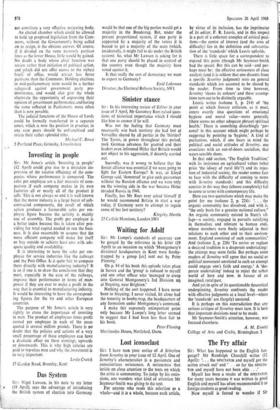Investing in people
Sir: Mr Jones's article 'Investing in people' (12 April) could give rise to a mistaken im- pression of the relative efficiency of the com- panies whose performance is compared. The sales per employee are a fair measure of com- parison if each company makes in its own factories all or nearly all of the product it sells. This is not always so and it is well known that the motor industry is a large buyer of sub- contracted components, the result of which action produces a favourable sales per em- ployee figure because the activity is mainly one of assembly. The profit per employee is a better index because this is taken after pro- viding for total capital needed to run the busi- ness. It is also reasonable to assume that the more efficient company will make for itself or buy outside to achieve least cost with ade- quate quality and availability.
It is interesting to have the sales per em- ployee for service industries like the railways and the Post Office. Is it quite fair to compare them directly with manufacturing industry? It is so if one is to draw the conclusion that they must, especially in the case of the railways, improve their performance in terms of man- power if they are ever to make a profit in the way that is essential to manufacturing industry. It would be interesting to have the correspond- ing figures for the us and other European countries.
The purpose of Mr Jones's article is very rightly to stress the importance of investing in men. The product of employees times profit earned per employee in each of the cases quoted is several million pounds. There is no doubt that the policies and actions of a very small percentage of these employees can have a dramatic effect on these earnings, upwards or downwards. This is why high salaries are paid to top-class men and why the investment is so very important.






































 Previous page
Previous page